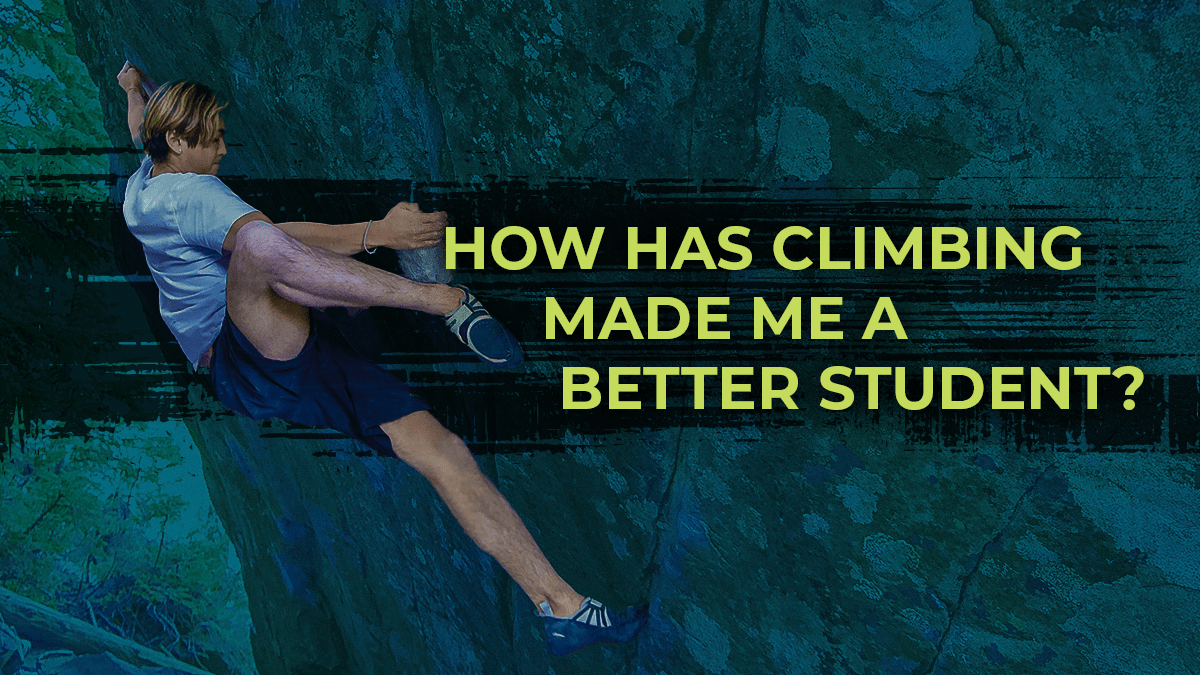How has Climbing Made me a Better Student?

by Leo Costanza
What is the difference between stepping onto the mats in a competition round and sitting in a lecture hall to take an exam? Truthfully, there isn’t much.
Performing at a high level, whether in school or sports, requires grit, perseverance, a passion for learning, and meticulous attention to detail. This emphasis on learning makes climbing so applicable to academic success. Climbing is a sport whose challenge primarily lies in the novelty of the problem presented before you. No two boulders or routes are the same, and each competition round presents athletes with a new set of climbs that are impossible to prepare for fully. All we can do as athletes is learn the techniques and strengths that allow us to piece together the puzzle of each new boulder problem or route. I don’t believe it is possible to master the sport of climbing. However, we can approach it with passion and curiosity to make the process more enjoyable and successful. This same passion and curiosity can be applied to academic learning, making the process more engaging and enthusiastic.

This past quarter, I took my first course in organic chemistry. Ochem is widely considered the bane of existence for most students (understandable), but I found it fascinating and a joy to learn. Although it is an incredibly complex subject that must be supported by a great many pillars of knowledge from previous courses, the content is easy to break down into parts by approaching it with the same techniques I have developed over the years as a climber. Like climbing, organic chemistry is not a subject you can master by memorizing full reactions (or routes). Instead, you need to understand all the fundamental properties of atoms and piece together bits of information to come to a logical conclusion. Organic chemistry is a coordinated dance of many moving parts that culminate in a beautiful reaction. I treat each boulder problem in the same way. Instead of seeing the problem as a whole, I break it down into individual movements and body positions that, when all combined, take me from the start to the finish.
It doesn’t matter if I top a boulder or devise the correct chemical synthesis because that correct solution is only relevant to that specific problem. In climbing, there is more value in learning how to do each move than just matching the finish hold because those same movements are constantly being reused. When I’m in practice, I continuously repeat a challenging move until I fully understand the micro body positions that make it possible. This repetition, as a means to discover small details, may seem insignificant, but it is responsible for the ability to recognize patterns and solve problems more quickly and efficiently in the future. It is impossible to prepare for exactly what the routesetter will throw at you, but by internalizing all the small details and movements from practice, you can approach a novel problem as if you have already seen it before.
Thriving under pressure:
I’m a student athlete. And as much as climbing is an integral part of my life, the student in me takes priority. Tackling academics is my biggest challenge, and being successful requires me to put myself in many high-pressure environments. Now that I am in college, I have begun to view my schedule as a series of exams to prepare for. Especially at a school on a quarter-term system, I am taking classes that cover content at an accelerated pace. There is very little space to breathe, and losing focus is unforgiving. Although my schedule makes it challenging to stay afloat, I have learned to thrive in this environment, and I attribute my success to competing in climbing for so many years.
One of the most tremendous benefits of competing in a sport is learning to understand the effort necessary to achieve your goals. Sports expose you to countless failures and opportunities to learn from your mistakes. I was fortunate enough to start climbing when I was 7 years old, and in the 13 years since, I have spent the majority of that time failing to reach my goals. However, I took away lessons about grit, organization, and discipline with each failure. Each of these lessons serves as a building block in my strategy for approaching the challenging school environment. I set lofty goals for myself, but I have learned through experience to structure my time efficiently and appreciate the immense effort it takes to achieve those goals. The value of learning from these failures in climbing and academics has made me more resilient and determined than ever.
I am incredibly grateful for climbing. Many, if not all, of my best qualities are a result of my time in the sport. I encourage everyone to pay attention to their approach to training and competition because it speaks volumes about who they are. I have certainly learned a great deal about myself through analyzing my climbing.




